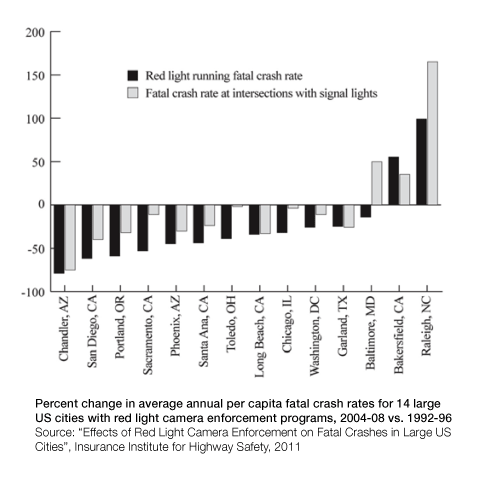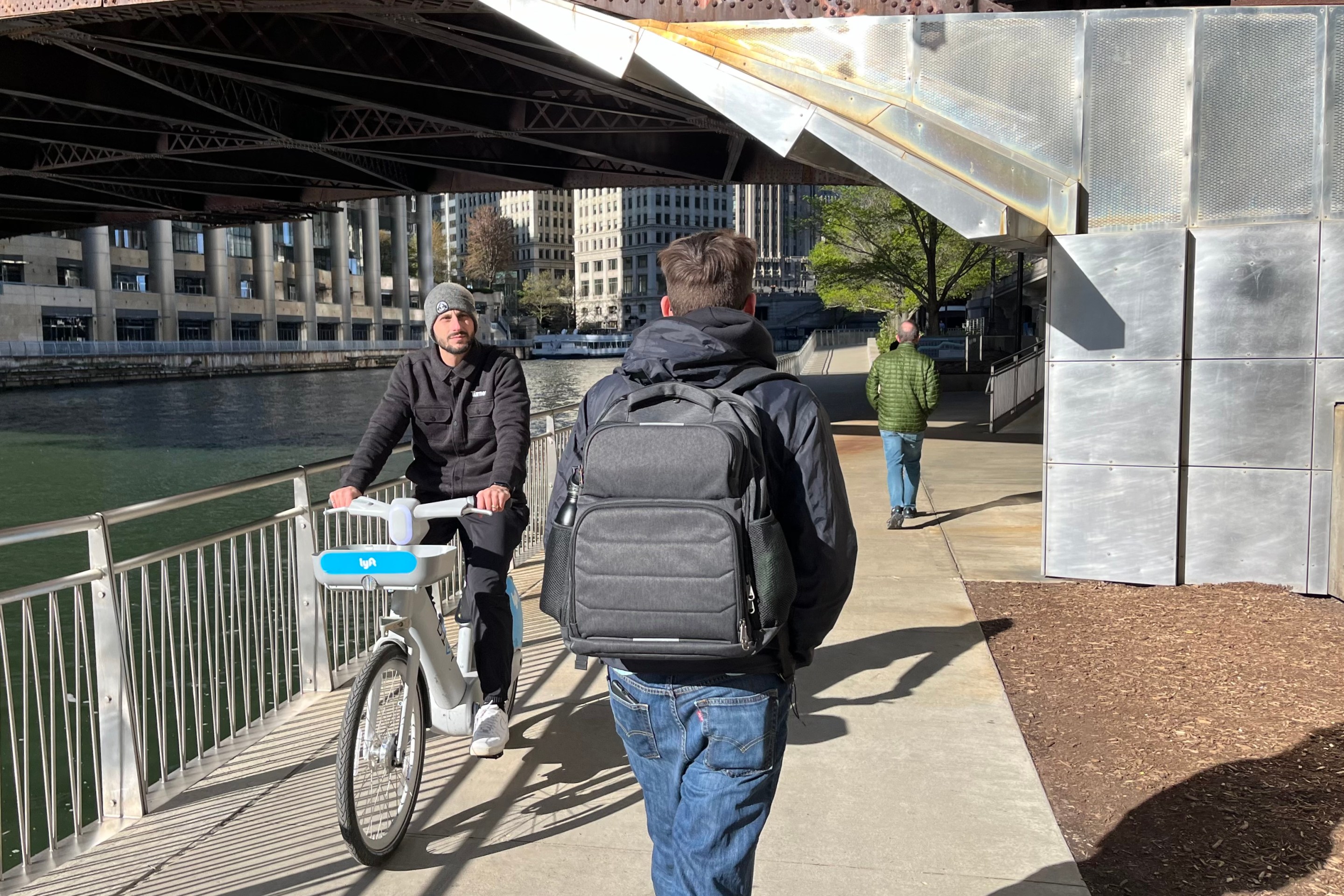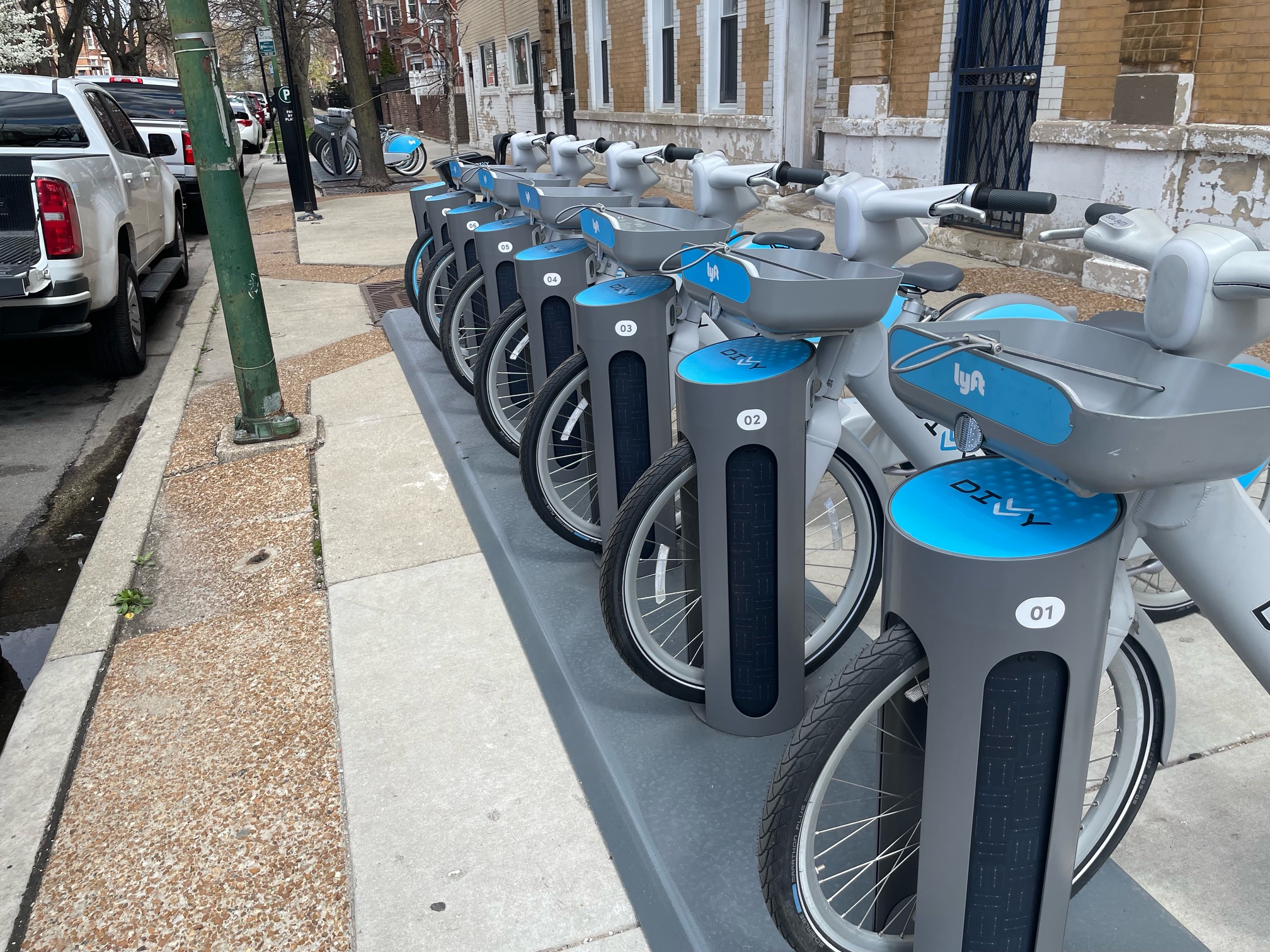CDOT Tells Council Improved Red Light Cameras Might Mean More Tickets
5:02 PM CDT on October 30, 2014

Chicago Department of Transportation commissioner Rebekah Scheinfeld told the City Council's Committee on Pedestrian & Traffic Safety that equipment problems that have plagued the city's red light camera enforcement program have mostly been resolved. Although some aldermen were there to pounce upon the media ruckus around the cameras, other aldermen understood that red light cameras can play a role in keeping Chicago's streets safer.
Alderman Deborah Graham (29th) recounted her experience with a motorist who ran a red light caused a car crash two years ago. "I was going through an intersection at Lake and Sacramento, and a woman trying to beat the traffic light cut me off, and I struck the CTA support beam," she told the committee at their regular meeting on Tuesday. "I had to have a major surgery," she said, adding, "So I have a real concern when we’re approaching intersections and dealing with the (red light) cameras."
Graham was asking Scheinfeld about how CDOT plans to keep equipment in "top-notch" form since the city changed vendors from Redflex, which used unreliable induction loop detectors, to Xerox, which uses a more accurate radar system that can easily be checked remotely.
Alderman Deb Mell (33rd) expressed her confidence in the changes that CDOT had made in response to the IG's investigation. "I think people drive way too fast in this city," she said, adding, "I’m really happy that we had this [hearing], and kind of air it out, and going forward, [red light cameras will] do their job."
Scheinfeld described changes CDOT has made to their agreement with Xerox, which include financial penalties if Xerox flags too many "false positives." (Violations are sent to IBM for a second review.) CDOT also reduced the allowable rate of "close calls" from 15 percent in Redflex's contract to 10 percent in Xerox's contract. The new contract has already had results: CDOT has already fined Xerox $28,867 for "failure to meet specified performance metrics."
She said these new "business rules" will be posted on the CDOT website, along with the violation data that's already been posted to the city's open data portal. If there are "spikes" in the future, an "early warning system" will alert Xerox staff, who will be required to consult with CDOT staff. Scheinfeld said that CDOT's own staff will also be monitoring violations data themselves, watching for anomalies.
Chicago Inspector General Joe Ferguson was also at the meeting to answer questions about his report [PDF], which detailed Redflex's poor record keeping and CDOT's lax management. Since the report was issued, he said, "CDOT has been extremely responsive to all of our suggestions."
Scheinfeld told the committee that some of the "spikes" in tickets that the Tribune has reported on so extensively occurred after repairs to the loop detectors. Ferguson explained that a possible reason for the so-called spikes was that the "trigger speed" had fallen at some locations to as low as 5 MPH, a limit that's since been raised to 13 MPH. The camera only starts recording motorists when they're traveling faster than the trigger speed, and even the less-sensitive 13 MPH trigger detects 99 percent of motorists who might be running a red light, Scheinfeld said.
Ferguson wrote that the trigger speed problem led to many periods of severe under-enforcement -- not over-enforcement, as the "spikes" suggest. In other words, more tickets should have been issued to violators than were issued.
Several aldermen made a fuss about tickets that were issued after a documented yellow light duration of 2.9 seconds, instead of the usual three seconds. This is within the 0.1 second range that an operational traffic signal is allowed to deviate from the programmed time. CDOT narrowed that window when it changed vendors: Redflex had to throw out any violation where the yellow light was less than 3.0 seconds, but Xerox can keep the violation when the yellow light was 2.9 seconds. (Xerox's software truncates instead of rounds, so 2.99 seconds is rounded to 2.9 rather than three.) Yet that sub-100 millisecond difference does not make or break a motorist's ability to come to a complete stop at a red light -- after all, that's less than half the 300 millisecond time it takes to blink. CDOT changed the rule in September, requiring Xerox to also throw out violations where the yellow light is recorded as being less than 3.0 seconds long.
None of the committee members doubted that red light cameras save lives. The Insurance Institute for Highway Safety [PDF] examined 14 cities with red light cameras between 2004 and 2008, and found that Chicago was among the 12 cities where red light running crashes made up a declining share of all fatal crashes. Across all of the cities, the rate of fatal red light running crashes decreased by 35 percent -- much higher than the 14 percent decrease seen in cities without red light cameras.
Alderman Graham went on to express her deeper concern for safety in Chicago. "I hope that driving behaviors improve, such that we come to a point where we don't need the cameras," she said. Graham asked for all Chicagoans to "take part in better driving habits, and behaviors on the road, and being friendly to our pedestrians and our bikers that are out there -- and courteous to our other driving comrades out there."
Read More:
Stay in touch
Sign up for our free newsletter
More from Streetsblog Chicago
The de-facto ban on riverwalk biking is back. What should we do about it?
In the short term, new signage is needed to designate legal areas for cycling on the path. In the long term CDOT should build the proposed Wacker Drive protected bike lane.
Today’s Headlines for Thursday, April 25
It’s electric! New Divvy stations will be able to charge docked e-bikes, scooters when they’re connected to the power grid
The new stations are supposed to be easier to use and more environmentally friendly than old-school stations.



